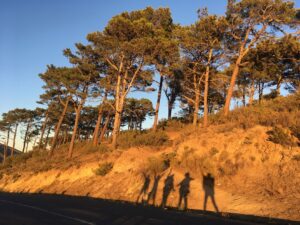By Dr Alison Buckler, Senior Research Fellow, The Open University
Academics can be bad at saying ‘no’. Our discomfort with declining exacerbates broader structural workload challenges leaving us over-committed and exhausted. But in this industry that champions individual success there are also important parts of our work in which we’re not always great at saying ‘yes’.

There is a principle in improvisational theatre (bear with me…!) called “yes, and…”. The premise is simple. In improv (an un-rehearsed, un-scripted game, activity or play) the aim is to keep the scene going. If one actor says “Look, there’s a bus coming” and another follows with “I can’t see a bus, plus we’re in space so it’s impossible!” it shuts the scene down, ‘blocks’ the other actor and makes them look silly. If the second actor follows instead with “Oh! It’s the no.342 to the moon! Let’s hop on!” they acknowledge the existence of the bus [the ‘yes’] and still take the scene into space [the ‘and’] but do so by affirming and building on the first actor’s contribution and, therefore, bringing them along.
The value of the principle has been written about in relation to the business world but, since I heard about it, I have noticed echoes of it in how academics I admire interact with students and colleagues, and I have been practising it more deliberately in my work as a researcher.
It is important to note that “yes, and…” does not aim to eliminate or overlook disagreement. The ‘yes’ part is not a definitive indication that you agree with someone, rather it is an affirmation of their perspective. It is a recognition that two things can be true, it helps you to actively and actually engage with an idea (rather than just defaulting to “no, because…”) and demonstrates your commitment to including this perspective in your shared learning journey. In this sense it enables practical engagement with social-learning theories, especially Wenger-Trayner et al.’s Landscapes of Practice, which embraces the complexity of competence and expertise.
In two research groups I am in “yes, and…” forms one of our principles for working and, used readily and reliably, it can boost confidence and willingness to put forward ideas, and encourage collective responsibility for moving a project forward. It is intrinsically linked to another improv principle that if everyone in a team doesn’t look good, then no one in the team looks good, which is a great motivator in a research community.
I find it helpful when reviewing, marking and examining too, where it inspires more compassionate and constructive feedback. Rather than thinking ‘what are the shortcomings of this work?’ or ‘how would I have done this differently?’ I try to think ‘what can I add to the effort and ideas demonstrated here?’. Perhaps (maybe somewhat grandly) this way of thinking might help us to be more open to pluralities of thought and diverse ways of generating and presenting knowledge.
It has also helped me to more confidently position my work in the field. Rather than being thrown into despair when I come across a study similar to my own, I now try to think ‘Yes, this is similar which makes it interesting to me, and there are also these differences which make our take on the subject distinctive’. A “Yes, and…” mindset highlights synergy over competition.
Of course, academia is not an improv game, there are real-life consequences. Recognising when to say “no” is essential, especially if something is discriminatory or offensive. But insights on this principle from the business world suggest that the more thoughtful and generous you are with your “yeses”, the easier it is for you and others to understand the significance of when you say “no”.
It is also important to acknowledge that intersections of privilege may increase the number of spaces where it can be practised, but the great thing about it is that you can start practising it in any group or conversation: ultimately, “yes, and…” starts from a principle of respect for what someone has said, shared or submitted.
Do you recognise “yes, and…” in your own approach, or that of colleagues? What encourages it, and what limits its potential? Can you think of a new space you could give it a go in?
Dr Alison Buckler is a Senior Research Fellow in International Education, and Deputy Director of the Centre for the Study of Global Development (CSGD), at the Open University. @AlisonBucklerEd
